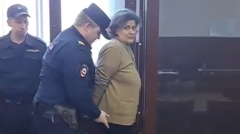As the city of Pokrovsk in eastern Ukraine becomes a battleground, the haunting melody of "Shchedryk" serves as a poignant reminder of the region's rich cultural heritage. Despite the threat of Russian invasion and pervasive destruction, local residents and defenders are determined to keep the spirit of their hometown alive through music and cultural preservation efforts.
Preservation Amid Destruction: The Legacy of Shchedryk in Ukraine

Preservation Amid Destruction: The Legacy of Shchedryk in Ukraine
The Christmas carol known as "Shchedryk," or "Carol of the Bells," remains a symbol of hope and resilience for Ukrainians facing the challenges of war, as they strive to protect their cultural identity in the face of destruction.
In the heart of a war-torn Ukraine, Pokrovsk, the birthplace of the beloved Christmas carol "Shchedryk," faces destruction amid ongoing conflict. The sound of heavy shelling reverberates through empty streets, as Russian troops advance closer to the city center, threatening both its physical structures and its cultural identity. Most residents have fled, and those who remain live in fear, scavenging for basic necessities amid shattered homes, electricity outages, and a lack of running water.
Among them is 59-year-old Ihor, who describes life in Pokrovsk as being on a "powder keg." Oksana, another local, shares her fears about the city's future, believing it is likely to succumb to invasion. The lingering presence of the war has ominously overshadowed Pokrovsk’s rich cultural past while prompting drastic measures, such as the removal of the monument to composer Mykola Leontovych, known for his composition of "Shchedryk" in the early 1900s.
Although largely unknown outside Ukraine, Leontovych's melody, inspired by Ukrainian folk traditions, gained worldwide recognition as "Carol of the Bells," particularly after being popularized in American media. Amidst the chilling realities of displacement, former residents like Viktoria Ametova and the Hasych family are determined to keep their memories of Pokrovsk alive—showcasing resilience through music practice in safer havens.
Meanwhile, "Shchedryk" has taken on renewed significance for Ukrainian soldiers, with military bands improvising instruments from their surroundings to uplift troop spirits. Colonel Bohdan Zadorozhnyy leads these musical efforts, emphasizing that the song embodies the spirit and resilience of Ukraine, promising to face the conflict with dignity despite tragic circumstances.
As the city of Pokrovsk teeters on the brink of loss, cultural leaders like Angelina Rozhkova strive to protect artifacts that capture the essence of their community's history, reminding the world that their fight is not just for land but for the preservation of their rich cultural heritage. "Keeping and saving, equals winning," Rozhkova states, embodying the steadfast spirit of the city's people as they bear a legacy meant to endure through adversity, much like the enduring notes of "Shchedryk."
Among them is 59-year-old Ihor, who describes life in Pokrovsk as being on a "powder keg." Oksana, another local, shares her fears about the city's future, believing it is likely to succumb to invasion. The lingering presence of the war has ominously overshadowed Pokrovsk’s rich cultural past while prompting drastic measures, such as the removal of the monument to composer Mykola Leontovych, known for his composition of "Shchedryk" in the early 1900s.
Although largely unknown outside Ukraine, Leontovych's melody, inspired by Ukrainian folk traditions, gained worldwide recognition as "Carol of the Bells," particularly after being popularized in American media. Amidst the chilling realities of displacement, former residents like Viktoria Ametova and the Hasych family are determined to keep their memories of Pokrovsk alive—showcasing resilience through music practice in safer havens.
Meanwhile, "Shchedryk" has taken on renewed significance for Ukrainian soldiers, with military bands improvising instruments from their surroundings to uplift troop spirits. Colonel Bohdan Zadorozhnyy leads these musical efforts, emphasizing that the song embodies the spirit and resilience of Ukraine, promising to face the conflict with dignity despite tragic circumstances.
As the city of Pokrovsk teeters on the brink of loss, cultural leaders like Angelina Rozhkova strive to protect artifacts that capture the essence of their community's history, reminding the world that their fight is not just for land but for the preservation of their rich cultural heritage. "Keeping and saving, equals winning," Rozhkova states, embodying the steadfast spirit of the city's people as they bear a legacy meant to endure through adversity, much like the enduring notes of "Shchedryk."






















